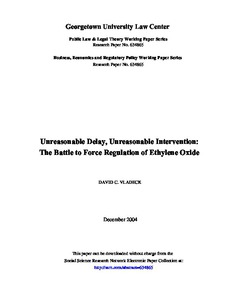Unreasonable delay, unreasonable intervention: the battle to force regulation of ethylene oxide
"This chapter tells the story of the seven-year battle to force the Occupational Safety and Health Administration to regulate ethylene oxide, a widely used industrial chemical that, at levels common in the workplace, causes cancer, spontaneous abortion and genetic damage. The chapter focuses on...
| Main Author: | |
|---|---|
| Institution: | ETUI-European Trade Union Institute |
| Format: | TEXT |
| Language: | English |
| Published: |
Washington, DC
2004
Georgetown University Law Center |
| Subjects: | |
| Online Access: | https://www.labourline.org/KENTIKA-19180542124919087249-unreasonable-delay,-unreasonab.htm |
| _version_ | 1771659896332222467 |
|---|---|
| author | Vladeck, David C. |
| author_facet | Vladeck, David C. |
| collection | Library items |
| description | "This chapter tells the story of the seven-year battle to force the Occupational Safety and Health Administration to regulate ethylene oxide, a widely used industrial chemical that, at levels common in the workplace, causes cancer, spontaneous abortion and genetic damage. The chapter focuses on two recurrent and controversial legal questions that formed the core of the dispute - (a) may courts force agencies to take action they would not undertake on their own, or to accelerate agency action that would otherwise proceed at a much slower pace, and (b) may the President, through the Office of Management and Budget, direct the work of agencies in promulgating regulations.
The chapter contends that the Supreme Court's recent ruling in Norton v. Southern Utah Wilderness Alliance does not cast doubt on the power of courts to compel a recalcitrant agency to take action where the agency's failure to act or delay contravenes the agency's statutory mandate. The chapter also challenges the legitimacy of the OMB regulatory review process, particularly OMB's interference in the development of health and safety rules. OMB was responsible for much of the delay in promulgating an ethylene oxide regulation. OMB's participation is, by design, a one-way ratchet, pressing agencies to do less, not more, to protect the public health and to focus on lower cost options, not more protective ones. OMB's cost-benefit focus is often anti-regulatory. Substantial evidence links ethylene oxide to genetic damage and spontaneous abortion, as well as cancer. But OMB refused to place a value on avoiding these reproductive harms but nonetheless argued that regulatory measures to guard against them were not economically justified.
The chapter ends by emphasizing that, although these issues were novel at the time that ethylene oxide battle was joined, they remain hotly contested today." |
| format | TEXT |
| geographic | USA |
| id | 19180542124919087249_c21a9ee681cc4b6084d97ffd2f653a01 |
| institution | ETUI-European Trade Union Institute |
| is_hierarchy_id | 19180542124919087249_c21a9ee681cc4b6084d97ffd2f653a01 |
| is_hierarchy_title | Unreasonable delay, unreasonable intervention: the battle to force regulation of ethylene oxide |
| language | English |
| physical | 48 p. Digital |
| publishDate | 2004 |
| publisher | Washington, DC Georgetown University Law Center |
| spellingShingle | Vladeck, David C. chemical safety chemicals control and regulation ethylene oxide legislation limitation of exposure occupational safety and health reproductive hazards occupational risks Unreasonable delay, unreasonable intervention: the battle to force regulation of ethylene oxide |
| thumbnail | https://www.labourline.org/Image_prev.jpg?Archive=117087993526 |
| title | Unreasonable delay, unreasonable intervention: the battle to force regulation of ethylene oxide |
| topic | chemical safety chemicals control and regulation ethylene oxide legislation limitation of exposure occupational safety and health reproductive hazards occupational risks |
| url | https://www.labourline.org/KENTIKA-19180542124919087249-unreasonable-delay,-unreasonab.htm |

